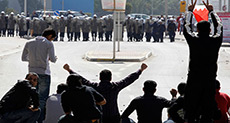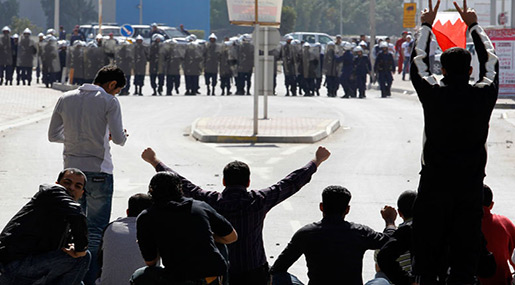
An Unhappy Isle: Bahrain is Still Hounding Its Shia

The Economist
A sagging rope, haphazard barricades-and fear. That is all it has taken to keep Diraz, Bahrain's largest Shia village, under siege for the past seven months. Two checkpoints bar access to all but residents. Friends and family members are kept out. Grocers offload their wares at the perimeter wall. And the protesters who once thronged to hear the island's leading Shia cleric, Isa Qassim, deliver his Friday sermon now stay at home.

"Forget the thousands who used to join rallies," says a cleric in a neighboring village, recalling the protests which erupted after tanks crushed the mass demonstrations for democracy in 2011. "Today we can't even find ten. Who wants to risk five years of prison and torture for ten minutes of glory?"
Though small, running out of oil and dependent on larger Gulf neighbors, Bahrain typifies how Arab autocrats have crushed the Arab Awakening's demands for greater representation. After six years of suppression, the Shia opposition is disheartened. Maligned as the cat's paw of Iran and a threat to Sunni rule in Bahrain, their movement is battered and broken. More than 2,600 political prisoners are in jail, a large number in a kingdom of just 650,000 people. Many of the detainees are children, says a former member of parliament from Wefaq, the Shia party the government banned last year. Hundreds have been exiled, scores barred from travel, and over 300 stripped of their nationality, including Sheikh Qassim. Even the execution on January 15th of three Bahrainis-the first for two decades-roused only sporadic unrest by the island's opposition.
The "national dialogue" that was espoused during more turbulent times by the king's son and crown prince, Salman bin Hamad, is on hold. Many of his erstwhile interlocutors are in jail on implausible terrorist charges. The online edition of the last independent daily newspaper was banned on January 16th. Although the graffiti on village walls declare "Death to [King] Hamad", few youngsters risk more than a token rally before police start firing birdshot. "We had a revolution and we lost," says a female protest leader now in exile.
Shia and Sunni subjects should share many grievances. Both resent a ruling family that hoards ministerial posts. The king's uncle, Khalifa bin Salman, is the world's longest serving prime minister, having been in place for 46 years. The king himself has ruled since the death of his father in 1999. Although the Al Khalifas monopolies power, they spread the pain of austerity. In line with Vision 2030, an economic program devised for Bahrain by McKinsey, a consultancy, they have cut subsidies on such basics as meat. Even this is not enough. The oil price would have to double to balance the budget. Last year Standard and Poor's, a ratings agency, judged the country's debt to be junk.
The government's fiscal measures have fallen most harshly on Shias. Fellow Gulf states have given billions in aid to prop up the kingdom, but much has been channeled into building housing for Sunnis and foreigners. New mansions, compounds and high-rise blocks screen rundown Shia villages. Undulating parks along the corniche beautify Sunni parts. The authorities have also chipped away at the demographic majority of the Shias, who once made up 60% of the population. A rash of new Hindu temples, churches and Sunni mosques testifies to an influx of non-Shia foreigners. Unusually for the Gulf, Bahrain has opened its doors to Syrian Sunnis from Jordan's refugee camps. An acrid xenophobia peppers Shia discourse. Shias gibe that even the ruling Al Khalifas, who came from the Arabian hinterland over the water in 1783, are foreigners.
Communal tension is less fierce in the few places where Sunnis and Shias live together. But sects that once shared the same streets in new towns built in the 1980s are now moving apart. Flags of Shia saints hang from the homes on one side of the main road through Hamad Town; Bahraini flags of loyalist Sunnis fly from the other. Intermarriage, too, is getting rarer, says Suhail Algosaibi, who runs an interfaith group. Alone of the Gulf states, Bahrain still marks Ashura, the holiest day in the Shia calendar, as a public holiday, but divisions are widening. Though some Sunni grandmothers still bake pomegranate cakes for Ashura, their husbands who once joined the chest-beating rites now furtively watch from afar. For many Sunnis, Shia villages are no-go areas.
Last month "ISIS" put out an hour-long video of a Bahraini ideologue from the same tribe as the royal family appealing for Sunni suicide bombers to attack the island's Shias. And on New Year's Day Shias broke into a high-security jail, freeing ten dissidents and prompting the opposition to ask if it might be more effective underground. "We desperately need a political process," says Jasim Hussain, a former Wefaq MP. "The country can't afford anything less."
Comments



